新概念英语2 第25课
- 格式:doc
- 大小:40.50 KB
- 文档页数:3
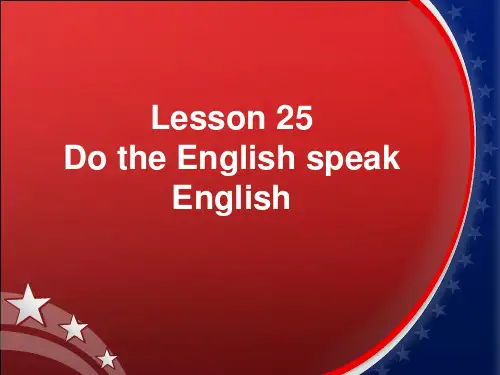
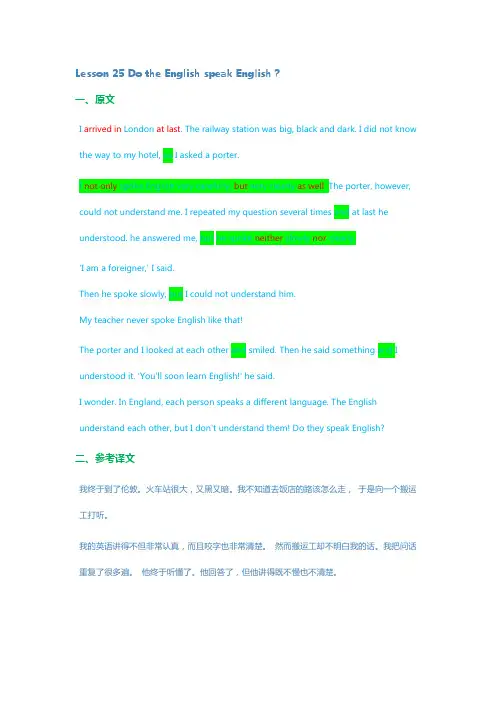
Lesson 25 Do the English speak English?一、原文I arrived in London at last. The railway station was big, black and dark. I did not know the way to my hotel, so I asked a porter.I not only spoke English very carefully, but very clearly as well. The porter, however, could not understand me. I repeated my question several times and at last he understood. he answered me, but he spoke neither slowly nor clearly.'I am a foreigner,' I said.Then he spoke slowly, but I could not understand him.My teacher never spoke English like that!The porter and I looked at each other and smiled. Then he said something and I understood it. 'You'll soon learn English!' he said.I wonder. In England, each person speaks a different language. The English understand each other, but I don't understand them! Do they speak English?二、参考译文我终于到了伦敦。
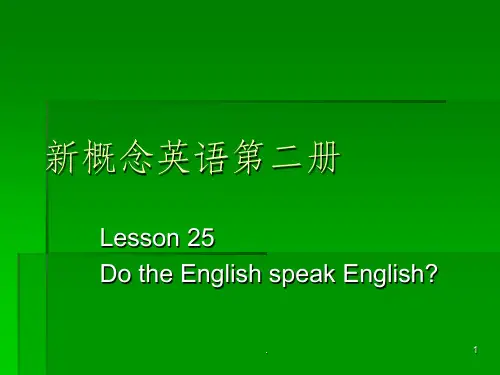
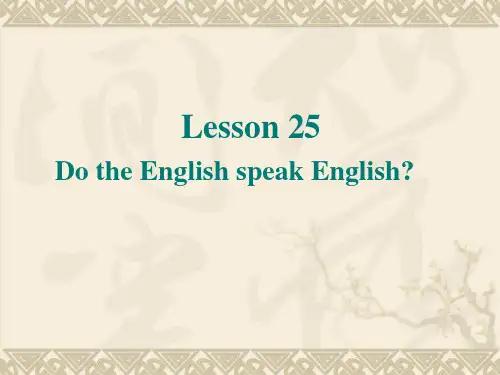
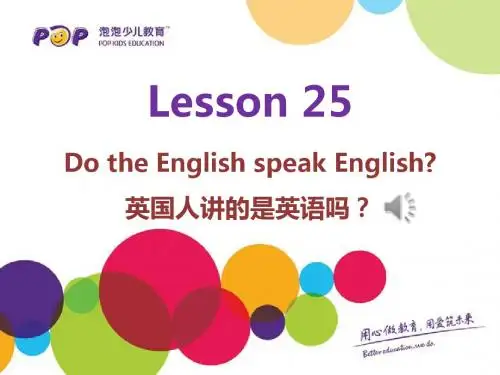
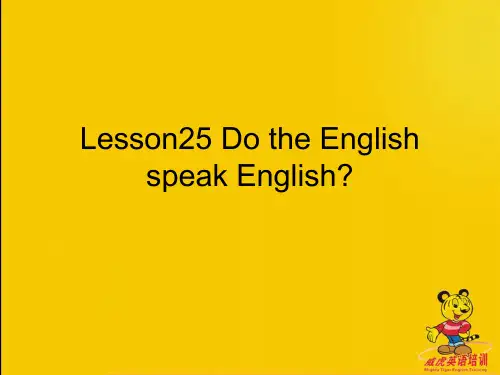

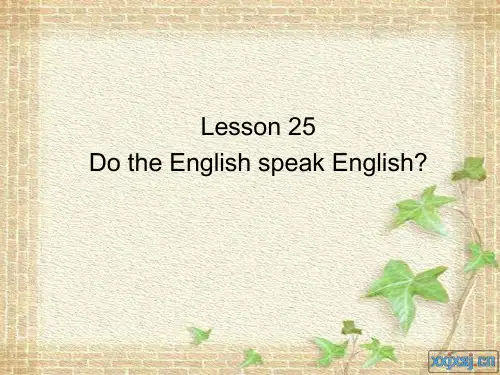
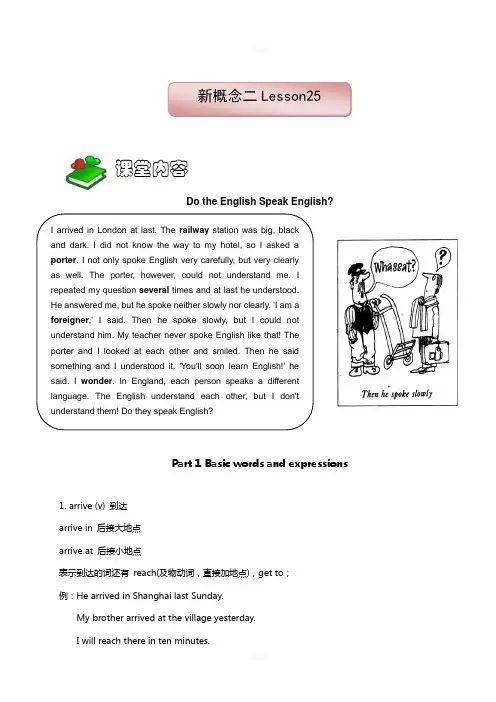
新概念二Lesson25课堂内容Do the English Speak English?I arrived in London at last. The railway station was big, blackand dark. I did not know the way to my hotel, so I asked aporter. I not only spoke English very carefully, but very clearlyas well. The porter, however, could not understand me. Irepeated my question several times and at last he understood.He answered me, but he spoke neither slowly nor clearly. 'I am a foreigner,' I said. Then he spoke slowly, but I could not understand him. My teacher never spoke English like that! Theporter and I looked at each other and smiled. Then he said something and I understood it. 'You'll soon learn English!' hesaid. I wonder. In England, each person speaks a different language. The English understand each other, but I don't understand them! Do they speak English?Part 1 Basic words and expressions1. arrive (v) 到达arrive in 后接大地点arrive at 后接小地点表示到达的词还有reach(及物动词,直接加地点),get to;例:He arrived in Shanghai last Sunday.My brother arrived at the village yesterday.I will reach there in ten minutes.When will you get to school?2. at last 最终;最后相当于finallyAfter some hard work, he passed the exam at last.3. railway n.铁路【词义相关】railroad 铁路(美)railway/railroad station 火车站The railway station was big, black and dark.A new railway is being built.4. the way to…去某地的路I don’t know the way to the nearest station.5. porter n.搬运工Did you remember to tip the porter? 你记得给搬运工小费了吗?6. not on ly…but also…的用法用于连接两个表示并列关系的成分,着重强调后者,其意为“不仅……而且……”;其中的also有时可以省略。
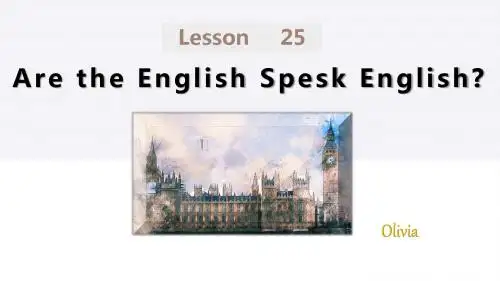
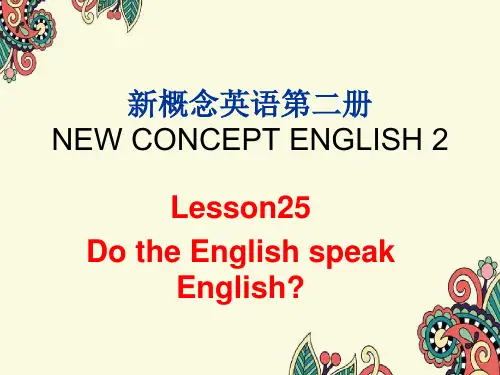
新概念英语第二册 lesson25 Do the English speak English?标题:English在这里均为名词,但意义不同。
第1个指“英国人”,为总称,后面的动词必须用复数;第2个指“英语”。
指语言时前面不加冠词,指人则要加the:English还可以作形容词,表示“英格兰的”、“英国的”、“英国人的”等;单词:1.★ railway n.rail(铁路)+way(路,途径) rail 扶手,栏杆,围栏railway/train station:火车站 highway 公路 subway 地铁2. ★ several 几个few+可数名词复数 little+不可数名词several+可数名词复数=a number of(一些)several times: I repeated my questions several times.some 一些即可以修饰可数,又可以修饰不可数a great number of… 大量的some time 一段时间 some time ago 一段时间以前sometime adv. 某时 sometimes adv. 有时, 偶尔3.★ foreigner n. 外国人a blue-eyed foreigner 蓝眼睛外国人foreign adj.①外国的,海外的外国留学生:foreign students洋货:foreign goods外交事务:foreign affairs②陌生的e.g. The subject is foreign to us.4.★ wonder v. 感到奇怪① wonder at sth. 对...事情感奇怪I wonder at the beauty of the old town.② I wonder 想要知道: want to knowI wonder if you have friend.③wonder about sth. 对什么感到怀疑what are you wondering about?你对什么感到疑惑呀?④No wonder that… 难怪…No wonder that he is the top student, he works so hard everyday.wonder n. 奇观Jane is a wonder. She never fails in her examinations.the seven wonders of the world in ancient times 世界古代七大奇观wonderful adj. 极好的e.g.I would be a wonderful wife.练习:1. 我想知道她什么时候能来。
第十二讲Lesson 25 Do they speak English?Grammar: Word order in compound statements.并列句的语序常见的并列连词一.New words and expression1. railway : railroad railway station 火车站2. several: 只能修饰可数n,与some 意思相近, Some: 修饰不可数或可数Several = a number of(一些), a large number of 大量的, 只修饰可数复数Sometime, some time, sometimes, some timessome times= Several times 好几次, 英文中不用some timese.g. I’ve told you the answer several times.3. wonder:1) n. 奇观--wonderful adj.2) v. 感到奇怪wonder at sth. e.g. I wonder at this.想知道=want to knowI wonder + whether/if 宾语从句+ when/ why/where/what/…宾语从句e.g. I wonder if you have any spare time.I wonder what time it is.(所有的宾语从句都要用陈述语序)Could you tell me how to get there?=I wonder how to get there.3) no wonder 难怪4. arrive: 到达arrive in/ at+地点, (in 跟大地点,at 跟小地点)reach vt.一定要加地点get to + 地点e.g. When will you get to Beijing?How can I get there?(get home/there, home, there是副词)5. the way to: know the way to schoole.g. I know the way very well. 对这条跟很熟know sth. well二.Language points: 常用连词:将两个简单句连接起来,就组成了并列句and, but, so, yet(注意与作副词的用法区别),or,both…and…, either…or, neither…nor, not only…but…as welle.g. Both you and I are from China.Either you or I ( be) right. Neither you nor he right.Neither you nor I will go to the party.He is not only a good teacher, but a good father as well.3. not only…but…as welle.g. I not only sing but dance as well.not only 常放在动词前,如果有实义和非实义动词,则放在两者中间e.g. I can speak not only Chinese but also English.=I can not only speak Chinese but also English.I not only like my mother but my father as well.4. however, 可直接放在名首,或句中,一定要加“,”5. neither…nor…可连接两个主语,宾语,谓语或表语Either…or…, neither…nor…, not only…but…as well 在连接两个主语时,谓语动词的形式要用“就近原则”,即:谓语动词的正确形式跟据离它最近的主语来确定其单复数。
三. Exercises for students.I. 单项选择.( )1. I could speak Japanese Chinese, so I had to talk to him in English.A. not only, but alsoB. both, andC. neither, norD. either, or( ) 2. Nancy looked around, didn’t see anybody.A. andB. butC. soD. because( ) 3. Study hard, you’ll pass the exam.A. orB. andC. butD. yet( ) 4. Tom, keep away from the fire, you’ll get burnt.A. andB. soC. orD. but( ) 5. We can’t go there together. you I can go.A. Both, andB. Either, orC. Neither, norD. Not only, but also( ) 6. you he is able to ski, but I am.A. Both, andB. Not only, but alsoC. Either, orD. Neither, nor( ) 7. You can stay at home go out to play. It doesn’t matter.A. either, orB. neither, norC. both, andD. not only, but also( ) 8. --I wonder without water. –About a week.A. how long man can liveB. how long can man liveC. when man can liveD. when can man liveII. 阅读理解.A storm dropped heavy rains on central and southern part of China last week. Along the Xiangjiang River in Hunan, floods caused by terrible rains killed 25people and 13 others were missing.The Chinese government warned Yunan and Chongqing of possible heavy rains over the next few days.In Changsha water levels rose to 38 metres early Monday morning, 3 meters above the danger line.In Guangdong, at least 21people were killed, while three were seriously hurt and seven went missing when heavy floods hit northern parts of Guangdong.The cities of Shaoguan, Meizhou and Heyuan were hardest hit and many people were left homeless.About 620 million yuan has been lost in the floods. Guangdong has sent something useful to Meizhou, Heyuan and Shaoguan to help the people who had lost homes build their homes again. ( ) 1. This passage is probably .A. a storyB. a menuC. a piece of newsD. a play( ) 2. Which city will probably have heavy rains soon?A. GuangzhouB. ShenzhenC. ShanghaiD. Kunming( )3. In Changsha, the danger line is meters.A. 35B. 38C. 45D. 620( ) 4. What caused the floods?A. EarthquakeB. Heavy rainsC. Tsunami(海啸)D. It doesn’t tell us( ) 5. Many people in Meizhou, Heyuan and Shaoguan had to build their homes again, because .A. their homes were too smallB. they had sold their homes after the floodsC. their homes were destroyed by the floodsD. their homes fell down in the earthquakeKeys: 1-4: cbbc 5-8: bdaa 1-5: cdabc。